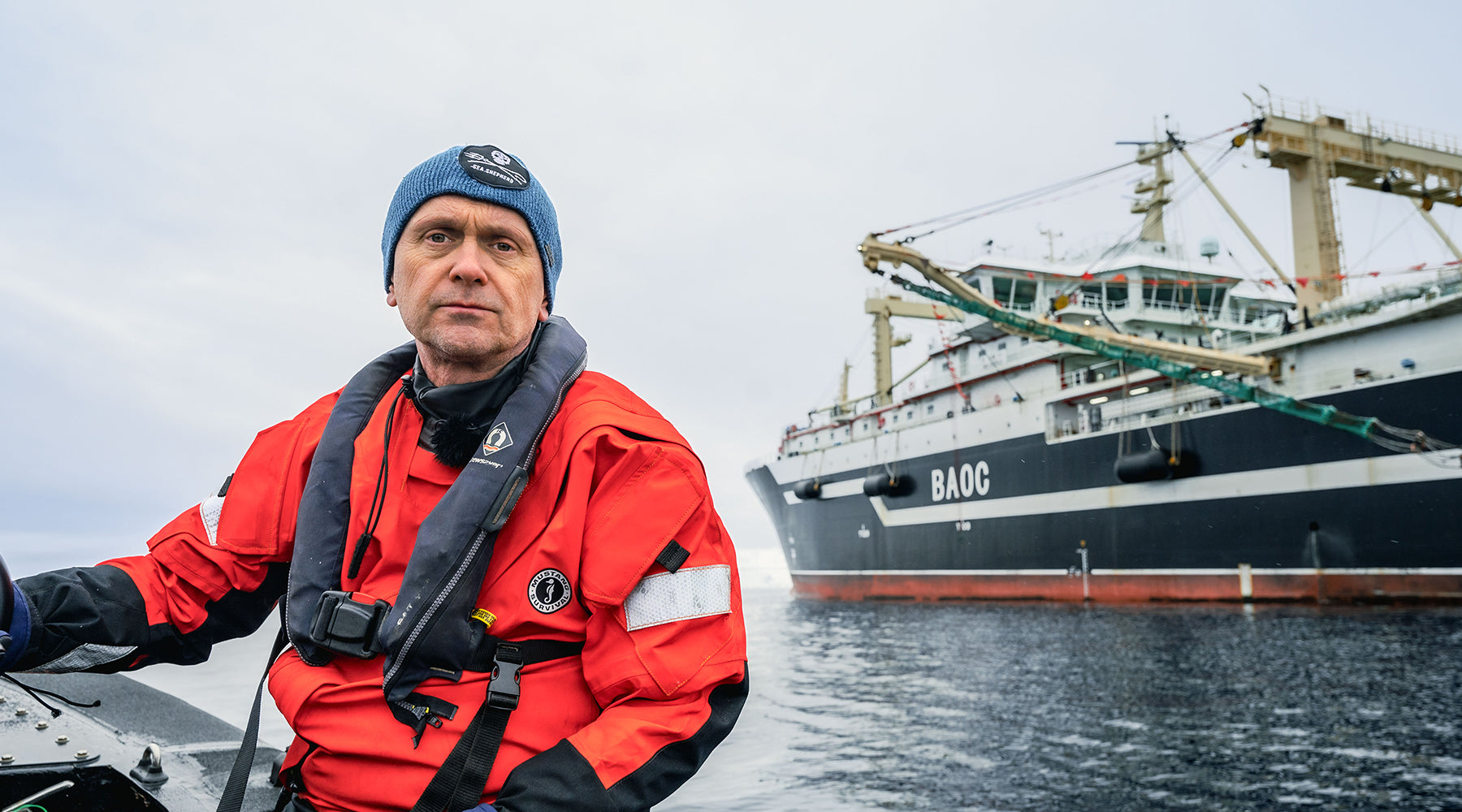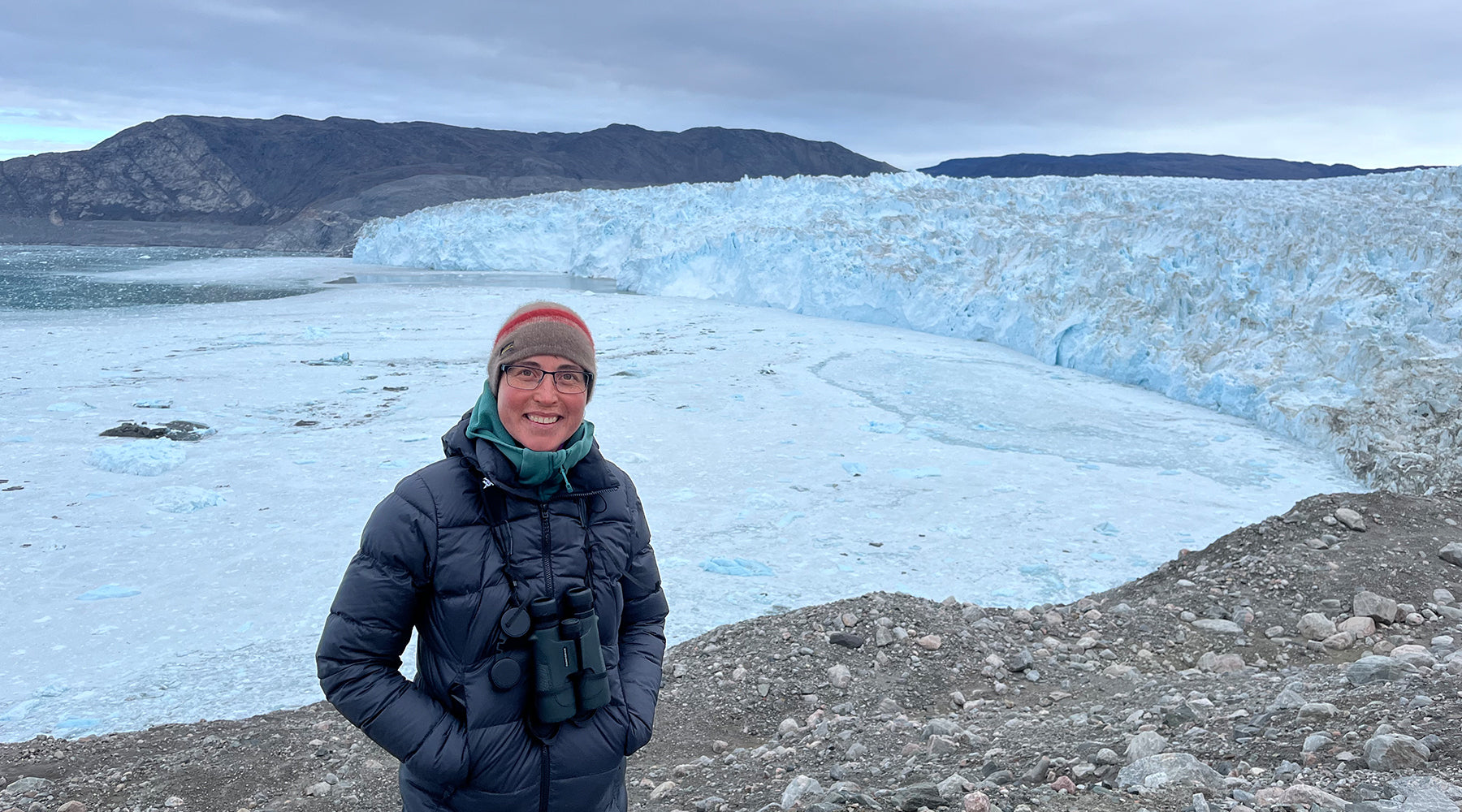
SHACKLETON MEDAL 2025: MEET THE SHORTLIST - ALEX CORNELISSEN
Sea Shepherd Global CEO
Returning to Antarctica this year with Sea Shepherd, Cornelissen continues to lead a campaign to expose the environmental risks of krill fishing and transshipments in the Southern Ocean. His decades of frontline marine conservation continue to hold illegal and exploitative operations to account.
Could you talk about Sea Shepherd’s campaign Operation Antarctica Defence, which woke people up to the scale of the plundering of the Southern Ocean for krill?
We have a long history of campaigns in the Antarctic. We decided to focus on this because of a study that came from Stanford University, where they discovered a mega pod of 1,000 fin whales which had been infiltrated by four large fishing vessels trawling for krill. We decided to go down there ourselves and take cameras with us to document what was happening. We were shocked by the amount of krill that was being taken out. The areas where they were fishing were also essentially where the whales were feeding. We decided to go back last year, and then we got interest from Silverback Films, who shot many of the scenes from David Attenborough’s Ocean while embedded on our ships Age of Union and Allankay.
This year we decided to bring scientists ourselves from Stanford University. We're hoping that by doing these studies with scientists on board, we can show that there are actually far fewer krill than there were when data on the krill population was last collected. We really want to get the trawlers out of the three areas where the greatest concentration of krill is, because if we manage that then the krill fishing will no longer be economically viable. So we’re really pushing for the creation of MPAs, especially to the north of Coronation Island. That’s where there’s the biggest congregation of whales. But also the peninsula. It’s really disgusting to see this kind of fishing in such a pristine environment.

The Southern Ocean is an incredibly dangerous and difficult environment. Can you talk about the logistical challenges of what you’re doing?
Our krill campaigns are relatively short, they only last for three, four weeks, as opposed to the anti-whaling campaigns we’ve done which would last for three months. Still, we do have to cross the Drake Passage, which is often not pleasant. This year we were very lucky with the weather – it’s normally really bad in April. When we were targeting whaling ships, often it felt as if there was a freight train of storms going round the continent. But when we were dealing with Japanese whalers they were always leading us into the storms, which was not very comfortable I can tell you.

An organisation like Sea Shepherd is born because of frustration that international law and geopolitics isn't achieving what needs to be done? Would you agree with that?
Initially we were an organisation that would go up against whaling ships and would actually push the boundary of where we can go legally. Because of our anti-whaling campaigns, we became so well known worldwide - and documentaries were made about us - that we were able to actually start something new and work with governments, which is what we're doing now in West Africa and in the Pacific. These days we’re very much doing law enforcement. We have nine government partnerships where we’re actually bringing their officials on board to patrol their waters. Working with African nations and two Pacific nations, we have made 101 arrests. So the impact on illegal fishing has been big.
When did you make the switch to law enforcement?
Nine years ago. We made the change when Japan decided not to go down to Antarctica. We had our ships ready, and we decided we might as well go down because we had our crews and fuel and food supplies all organised. We started to look for illegal fishing vessels, especially Patagonian tooth-fishing vessels. What followed was the longest maritime chase, where our captain Peter Hammarstedt followed a vessel called the Thunder for 110 days. It was three oceans, and the captain of the Thunder became so desperate that he sank his own vessel to destroy the evidence on board. It was just off the coast of Sao Tomé and Principe. That’s how we started reaching out to these countries – we set up the first partnership with Sao Tomé and Principe and Gabon. From there we expanded into other countries.

What are you most proud of achieving in the last year?
Our octopus campaign in Greece. We set up a pilot scheme Greece when we didn’t really know how big the problem was, because we had done a campaign in Italy two years in a row where we pulled in a lot of illegal octopus traps. In Greece, within 17 days, we pulled in about six and a half thousand traps and freed hundreds of octopuses. This year we've decided to go back to that same area for two and a half months with the aim of destroying one thousand illegal traps.
Beyond that I’m also obviously proud of what we’ve been doing in Antarctica. For me it was the first time I’d been back in 13 years and it reminded me of how fantastic that environment is.
To be an activist is a vocation. How did you get into what you’re doing?
I took a year-long sabbatical in 2002 from being a graphic designer. It changed my life completely. I sold my apartment and quit my job. After a year I just wanted to go back to Sea Shepherd. In 2003 I was sent to Japan for action in Taiji, the cove where they drive dolphins into the bay and slaughter them. Together with another activist we went into the bay and freed 15 dolphins. We were arrested by the Japanese authorities and spent 23 days in jail. When I came out I knew I wanted to be a full time activist, because I saw the impact it had made. When you’re in jail you’re not sure what’s going on. But after they released me, people were saying “You have letters from Piers Brosnan” and you have other people who want to collaborate, and it feels like the whole world is talking about the issue.

What would you like people to take from what you’re doing?
The good news is that the ocean can recover. I mean, its situation is not good at the moment. The ocean is really in trouble. But if you look at all these rewilding projects that are happening, where you see where marine protected areas are actually no take zones [where all fishing is prohibited], you see that not only is wildlife recovering in those areas in an extremely fast time period, you have this overspill into adjacent areas. fishermen also say this, like rewilding really works, but you have to close off areas fishing. So I would say, push for protecting 30% of the world’s oceans by 30, but make it 30% fully protected and look at the most important areas, especially Antarctica. That is an area where I’d like to see no commercial activity whatsoever. It’s an area we absolutely have to leave alone.
By Rachel Halliburton


